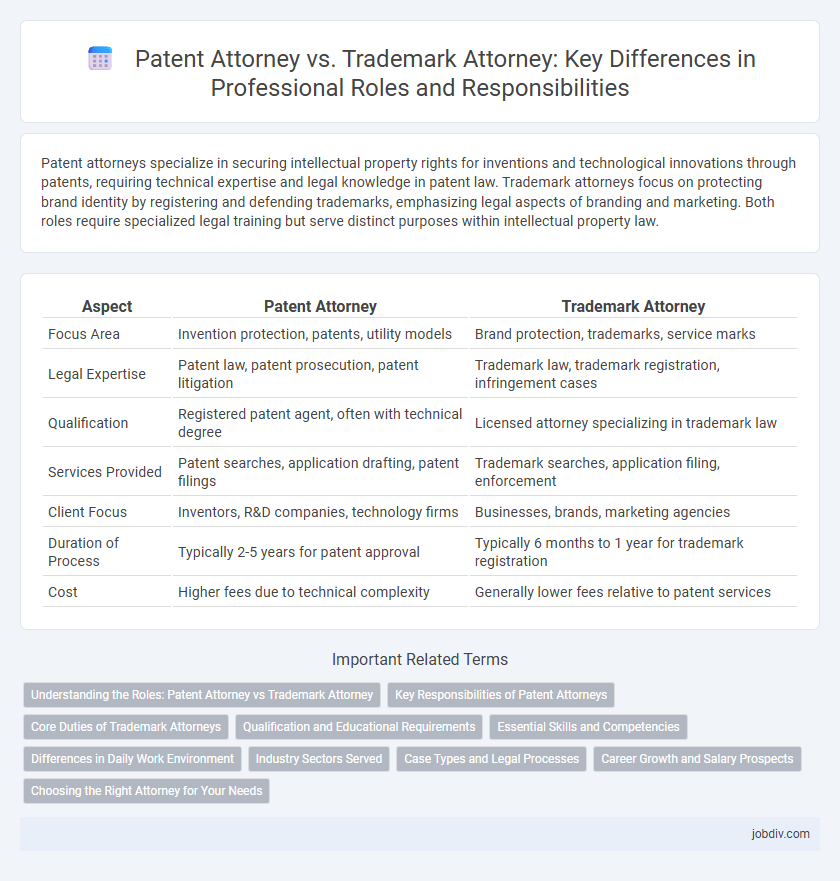Patent attorneys specialize in securing intellectual property rights for inventions and technological innovations through patents, requiring technical expertise and legal knowledge in patent law. Trademark attorneys focus on protecting brand identity by registering and defending trademarks, emphasizing legal aspects of branding and marketing. Both roles require specialized legal training but serve distinct purposes within intellectual property law.
Table of Comparison
| Aspect | Patent Attorney | Trademark Attorney |
|---|---|---|
| Focus Area | Invention protection, patents, utility models | Brand protection, trademarks, service marks |
| Legal Expertise | Patent law, patent prosecution, patent litigation | Trademark law, trademark registration, infringement cases |
| Qualification | Registered patent agent, often with technical degree | Licensed attorney specializing in trademark law |
| Services Provided | Patent searches, application drafting, patent filings | Trademark searches, application filing, enforcement |
| Client Focus | Inventors, R&D companies, technology firms | Businesses, brands, marketing agencies |
| Duration of Process | Typically 2-5 years for patent approval | Typically 6 months to 1 year for trademark registration |
| Cost | Higher fees due to technical complexity | Generally lower fees relative to patent services |
Understanding the Roles: Patent Attorney vs Trademark Attorney
Patent attorneys specialize in protecting inventions by securing patents, requiring expertise in technology and patent law to draft and prosecute patent applications. Trademark attorneys focus on safeguarding brand identity through trademark registration and enforcement, emphasizing knowledge of branding, marketing, and trademark law. Understanding these distinct roles helps businesses select the appropriate legal expert for intellectual property matters.
Key Responsibilities of Patent Attorneys
Patent attorneys specialize in securing intellectual property rights by drafting, filing, and prosecuting patent applications to protect inventions across various industries such as technology, pharmaceuticals, and engineering. They conduct patentability searches, analyze prior art, and provide legal counsel on patent infringement and licensing issues. Their expertise encompasses patent portfolio management and ensuring compliance with patent laws and regulations worldwide.
Core Duties of Trademark Attorneys
Trademark attorneys specialize in securing and protecting brand identities through trademark registration, clearance searches, and enforcement against infringement. They conduct legal analysis to ensure trademark eligibility, file applications with relevant intellectual property offices, and represent clients in opposition and cancellation proceedings. Their core duties also include advising on trademark licensing, monitoring brand use, and managing international trademark portfolios to safeguard clients' proprietary rights.
Qualification and Educational Requirements
Patent attorneys must possess a technical or scientific degree, such as in engineering, chemistry, or biology, and pass the patent bar exam to practice before the United States Patent and Trademark Office (USPTO). Trademark attorneys typically require a law degree (JD) and admission to a state bar, but do not need a technical background or to pass the patent bar. Both must complete rigorous legal training, yet patent attorneys uniquely combine specialized scientific expertise with patent law qualifications.
Essential Skills and Competencies
Patent attorneys possess specialized technical expertise in fields such as engineering, biotechnology, or chemistry, enabling them to draft and prosecute patent applications with precision. Trademark attorneys demonstrate strong knowledge of branding, marketing law, and intellectual property rights, excelling in trademark searches, registrations, and dispute resolutions. Both roles require exceptional analytical thinking, attention to detail, and proficiency in legal research and client counseling to navigate complex intellectual property regulations effectively.
Differences in Daily Work Environment
Patent attorneys primarily engage in technical patent drafting, prosecution, and litigation, requiring deep expertise in science or engineering fields. Trademark attorneys focus on brand protection, handling trademark registration, oppositions, and enforcement, often interacting extensively with marketing teams. The daily work environment for patent attorneys involves more complex technical research and patent portfolio management, while trademark attorneys emphasize legal strategy around brand identity and consumer perception.
Industry Sectors Served
Patent attorneys primarily serve technology-driven sectors such as pharmaceuticals, biotechnology, software, electronics, and engineering, where protection of inventions and innovations is crucial. Trademark attorneys focus on industries centered around branding and marketing, including retail, consumer goods, fashion, entertainment, and hospitality, ensuring brand identity and trademark rights are secured. Both professionals address distinct legal needs, aligning their expertise with specific industry requirements and intellectual property types.
Case Types and Legal Processes
Patent attorneys specialize in securing patents for inventions involving novel processes, machines, or compositions of matter, handling technical patentability assessments, prosecution, and infringement litigation. Trademark attorneys manage brand protection by registering trademarks, addressing oppositions, cancellations, and enforcement against unauthorized usage to safeguard brand identity. The legal processes for patents involve rigorous examination of novelty and utility, while trademark cases focus on distinctiveness and likelihood of confusion in the marketplace.
Career Growth and Salary Prospects
Patent attorneys typically command higher salaries due to their specialized technical expertise in intellectual property rights related to inventions and innovations. Career growth for patent attorneys often involves advancing within technology-driven industries, law firms, or corporate patent departments, reflecting strong demand for expertise in patent prosecution and litigation. Trademark attorneys generally experience steady career progression with competitive salaries, focusing on brand protection, which is crucial for businesses in marketing, advertising, and consumer goods sectors.
Choosing the Right Attorney for Your Needs
Selecting the right attorney depends on whether you need to protect inventions or brand identity, as patent attorneys specialize in securing patents for technological innovations while trademark attorneys focus on registering and defending trademarks. Understanding the nuances of intellectual property law relevant to your business ensures tailored legal strategies that safeguard your assets efficiently. Consulting an attorney with specific expertise in patents or trademarks aligns legal protection with your unique commercial goals, reducing risks and maximizing value.
Patent Attorney vs Trademark Attorney Infographic

 jobdiv.com
jobdiv.com